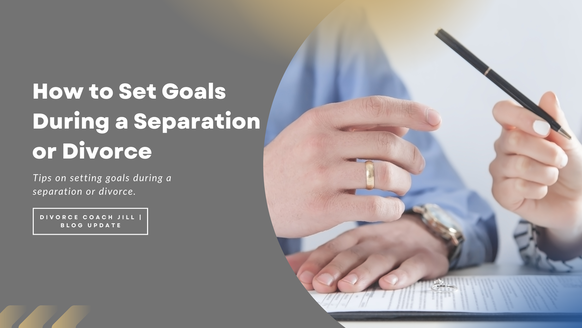|
Setting boundaries with your ex-spouse or any difficult person can be complicated. Many of us are taught as children that being nice means not asking for what you want but that’s exactly what you need to do when you’re an adult, as long as it’s in a healthy, respectful way. It can be challenging to set boundaries with someone who doesn’t respect them, but it is possible with the right approach. Here are some tools that will help you set boundaries with your ex-spouse or any difficult person:
1. Identify Your Boundaries The first step in setting boundaries is to identify them. Think about what behaviors or actions from your ex-spouse or difficult person are not acceptable to you. These may include things like name-calling, yelling, or invading your personal space. For everyone this is different. Really think about what you think is ok and what’s not ok. 2. Communicate Your Boundaries Clearly When setting boundaries, it is important to communicate them clearly. Be direct and specific about what behaviors or actions are not acceptable to you. Use “I” statements to express how their behavior makes you feel. You can’t worry about being nice - you can be respectful while not being nice and set a clear boundary. If you’re worried about how to do this, practice in a mirror or with a close friend. If you talk around an issue instead of stating it clearly, the person may not understand what your boundary is. 3. Stick to Your Boundaries Many people communicate a boundary and think that’s the end of setting a boundary. Actually, that’s just the beginning. Once you have communicated your boundaries, it is important to stick to them by doing something. This may mean walking away from a conversation or ending a phone call if your ex-spouse or difficult person crosses a boundary. Sticking to your boundaries is the only way to show that you are serious about them. 4. Don’t Engage in Arguments You don’t have to say anything once you’ve communicated a boundary clearly. Defending or arguing will only escalate the situation and make it more difficult to set and maintain boundaries. Stay calm and don’t get defensive when communicating your boundaries. 5. Seek Support You may have difficulty setting boundaries because of experiences you had when you were a child when you tried to set a boundary. It’s important to seek support from friends, family, or a therapist. They can provide you with emotional support and help you stay accountable to your boundaries. Setting boundaries with your ex-spouse or any difficult person can be challenging, but with these tools, you’ll be able to set clear boundaries, avoid escalations and arguments and stick to the boundaries that you set. If you haven’t been able to set boundaries in the past, it may take some time and patience to get good at these skills. Practice using these tools and eventually you’ll be awesome at setting boundaries with everyone you need to in your life! Marriage is hard! It takes work, sacrifice and compromise. And it helps to have a childhood with parents who had a good marriage, which is not that common. But even if you had good roles models from your parents, you still can go through tough times in your marriage. All long-term marriages go through ups and downs. So what do you do if you’re in one of those down times?
You have several choices: 1. Do nothing. You can detach from your partner, do your own thing and hope you both let things go. Eventually things could get better. 2. Ask for a divorce. You’ve been unhappy for a while and you’re sick of feeling this way. You don’t know what else to do so you think that divorce is the only answer. 3. Marriage counseling. An experienced marriage counselor can help you work through past hurts and build new skills that can improve your relationship. 4. Marriage retreat. This is where you spend a weekend with an experienced professional, and other couples who are struggling, and work intensely on improving your marriage. You can make a lot of progress in a relatively short amount of time. 5. Individual counseling. Individual counseling is never a bad thing to do. You’ll benefit no matter what happens to your marriage. What if your spouse won’t agree to do anything? Then you have a limited amount of choices but you still have choices. What if you’ve tried marriage counseling and it hasn’t worked? Then individual counseling or coaching can help you make the decision about what you want to do. There are many people who stay in unhappy marriages because they’re too scared to do anything else. And it is scary to face your problems head on. But if you have the right support, you’ll be amazed how strong you are. Reach out if you need someone to walk with you through this journey – whether it’s how to save your marriage or how to get yourself prepared for divorce. I’m a marriage counselor, individual therapist and coach and I can support you wherever you’d like to go. Contact me at [email protected] Going through divorce can be one of the most challenging experiences of your life. It's easy to feel overwhelmed, stressed, and uncertain about what the future holds. However, it's important to remember that divorce doesn't have to mean the end of happiness. By taking proactive steps to care for yourself and your emotional well-being, it's possible to find happiness again, even during the divorce process.
One powerful tool for finding happiness during a divorce is divorce coaching. A divorce coach is a trained professional who can provide guidance, support, and resources to help you navigate the emotional and practical aspects of the divorce process. A divorce coach can help you manage your emotions, communicate effectively with your ex-spouse, and develop a plan for the future that meets your needs and goals. Here are three steps you can take to find happiness again during a divorce: 1. Take time for self-care: Divorce is a stressful and emotional experience, and it's important to take care of yourself during this time. Make time for activities that bring you joy and relaxation, such as exercise, meditation, or spending time with friends and family. 2. Focus on the positive: When going through a divorce, it's easy to get caught up in negative thoughts and emotions. Instead, focus on the positive aspects of your life and the things you are grateful for. Practicing gratitude can help shift your mindset and improve your overall well-being. 3. Develop a plan for the future: While divorce can be a difficult process, it's also an opportunity to create a new life for yourself. Take time to think about your goals and aspirations for the future, and work with a divorce coach to develop a plan that aligns with your vision. If you're going through divorce and want support and guidance to find happiness again, I can help. As a divorce coach, I offer personalized support and resources to help you navigate the challenges of divorce and create a plan for a brighter future. Contact me today to schedule a consultation and learn more about how divorce coaching can benefit you. To contact me for divorce coaching, visit my website at www.divorcecoachjill.com. You can schedule a consultation to learn more about my services and how I can help you through this challenging time. With my support and guidance, you can find happiness again during and after the divorce process. Divorce mediation is a process where you and your soon-to-be-ex (STBX) work with an impartial third party to negotiate the financial and parenting aspects of your divorce agreement. There are ways to prepare yourself emotionally for the divorce mediation process to make it less stressful and more effective.
Keep In Mind That It's Not About Who Wins or Loses You and your STBX are going to have disagreements as you go through your mediation process. It’s important to remember that winning is not as important as reaching an acceptable agreement for both parties. Be prepared to let go of the need to win and instead focus on finding a resolution that works for both of you. Know What’s Important To You Knowing what’s important to you is key to understanding how to prepare for mediation. Think of the dream solution – if you could have everything you want, what would that look like? Then think about what you could give up. Do you want to keep the marital home? How important is that to you? Are you agreeable to 50% custody? Knowing what’s important to you and what you can give up will help you keep your emotions in check so that you can get to an agreement. Focus On The Future The purpose of divorce mediation is to agree on what’s going to happen in your and your children’s future. Sometimes during mediation one party brings up something that happened in the marriage in the past. It’s usually not helpful to discuss emotional issues from the past during mediation. If you or your STBX starts to do this, respectfully redirect your attention to discussions about the agreement and the future. Mediation is about moving forward so think about the following questions:
Keep Emotions Out Of It During mediation, you’re negotiating one of the most important transactions in your life. You must be able to think clearly in order to make all of the important decisions that you need to make. If you’re emotional, you won’t be able to think clearly. If you feel upset, take a few deep abdominal breaths and try to relax. It may also be helpful to take breaks throughout the mediation process to clear your head. Otherwise, you may say or do something that you'll regret later. Final Words Divorce mediation can be a very difficult, emotional process. However, by preparing yourself mentally and emotionally for the journey ahead, you can make the experience a little more manageable. If you're considering divorce mediation, it's important to talk to someone who can help guide you through the process and offer support. A divorce coach can be an invaluable asset during this time – they can provide information about what to expect during mediation, help you prepare for mediation, and help keep you accountable throughout the process. No one tells you what to expect after a divorce. For some people, it's a total relief. They can finally start living their lives the way they want to. But for others, it can be challenging. There's so much change happening all at once, and it can be hard to know where to start. In this blog, we will go through ways to be happy in your post-divorce life.
Grieving Leads To Happiness The process grieving is a necessary part of moving on. Research has shown that those who don't allow themselves to grieve after a divorce are more likely to experience long-term negative effects such as depression and anxiety. So what does it mean to grieve? It means that you go through the five stages of grief: denial, bargaining, anger, sadness and eventually acceptance. And it’s important to remember that grief is not a straight line so you may be in any of the 5 stages at any point in time. These emotions are all normal reactions to grief and it’s common to cycle through these stages multiple times. Allow yourself the time and space to grieve in whatever way works best for you. Journaling is a great tool to help you process your grief. With time and patience, it is possible to feel happier and more fulfilled as you go through the grieving process. Have A Support System Divorce can be a confusing and emotionally charged process. It’s important to build and reach out to your support system. This could be a divorce coach, close friends, a therapist, a support group, a minister or family members. Talking about what you are going through can help you make sense of your emotions and move on. A support system can offer so much when you’re in need of practical advice, a safe place to vent or even help with childcare. Learn To Manage Your Finances Taking control of your finances after a divorce is important so that you can understand and have clarity about so many important decisions in your life. First, make a budget from your previous year of expenses so that you can project out what you need to live on. Start by listing your monthly income and expenses, then see where you can cut back or make adjustments. Second, get organized and keep all of your critical financial documents in one place so you can easily find them when you need them. This includes things like tax returns, bank statements, and investment accounts. A financial advisor, accountant and a CDFA can help you with all of this. Celebrate Singleness Being single after a divorce can be liberating. Your relationship status for so long defined you - now you get to define yourself. This is a time to reconnect with who you are and what makes you happy. It's also a chance to set some new goals and create a life that is even better than before. Of course, there are challenges to being single, but that’s all part of the journey. Embrace your new status and enjoy being single. You may just find it's something to be grateful for! Indulge In Self-Care It can be easy to get lost in the shuffle of everyday life and put your own needs on the back burner. However, it's crucial to take some time for yourself to recharge and refocus. Dedicate some time each week to do something that brings you joy, whether taking a yoga class, going for a walk in nature, reading your favorite book, or getting a massage. You have to make self-care a priority because if you wait until you have time, you may not ever make time for this. Develop New Interests After a divorce, it can be difficult to know what to do with your life. You may have spent years focused on your family, and now you find yourself suddenly with a lot of free time. This is an opportunity to pursue interests that you never had time for. Maybe you've always wanted to learn to play the guitar or take up painting. Perhaps you've always dreamed of traveling but never had the chance. Now is the perfect time to develop those interests. It will give you something to focus on outside of your divorce and help you meet new people. Don't be afraid to pursue your passions after a divorce – it can be just what you need to start fresh and build a great life for yourself. Yes, You Can Be Happy After Divorce! Divorce is one of the most difficult things a person can go through. But it doesn't have to be the end of your happiness. You can be happy after divorce. Take your divorce journey one day at a time, and don't be afraid to reach out for help when you need it. You’ll find that each step that you take to move forward will make it that much easier to continue. And eventually, you’ll become so grateful for the new life that you have and you won’t be able to imagine any other life. Are you in a relationship with someone who makes you feel like you're constantly walking on eggshells? Do you think you can never do anything right and that your partner is always ready to criticize or accuse you of something? If so, then you may be experiencing gaslighting.
Unfortunately, gaslighting is a common form of emotional abuse. In this blog post, we'll discuss what gaslighting is, how to identify it, and what steps you can take to protect yourself from it. What is Gaslighting? Gaslighting is a type of emotional abuse in which the abuser subtly or overtly undermines the reality of their partner. It is a particularly insidious form of abuse done gradually, making it difficult for the victim to detect. Even if the victim is aware that something is wrong, they may doubt themselves, believing that they are being paranoid. Signs That You're Being Gaslighted Listed below are common signs that your partner is gaslighting you:
What Can You Do About it? Recognize the problem – It is critical to recognize the signs of gaslighting. Common examples of gaslighting:
Practice self-compassion – You deserve to be treated with respect and kindness. Fill your life with people who make you feel good about yourself and who will support you during difficult times. Healing from gaslighting will take time, but it is possible. You are strong and capable of overcoming this challenge. Confront your partner – Try to have a conversation with them about it. There's a possibility they're not even aware they're doing it, and simply bringing it to their attention may be enough to get them to stop. You can also put up boundaries. If your partner treats you disrespectfully, end the conversation and let them know that you’ll speak to them when they are respectful. Leave the relationship – It's critical to take action if you're in a relationship with someone who gaslights you and won't stop the behavior. If your partner becomes enraged or puts you in danger, you should think about ending the relationship. Remember that you’re entitled to a healthy and secure relationship. Gaslighting can be a sign of emotional abuse, and it can have a significant impact on your mental and emotional health. If you're in a relationship with someone who is gaslighting you, a therapist or marriage counselor can work with you individually or as a couple to give you ways to improve the behavior and possibly improve the relationship. As you go through your divorce, imagining life post-divorce can be difficult. You can get caught up in the day to day challenges and lose sight of what your life will look like after you’re legally divorced. One of the best ways to make the transition easier is to set goals for yourself. Doing so will help you focus on what's important and keep you moving forward. Here are a few tips on setting goals during a separation or divorce.
Keep your goals focused on what you want your future life to look like Give yourself some time to think about your future life - post divorce. Write down where you’d like to live, what you’d like to be doing, how you’ll spend time with your children, and anything that you can think of that will make the next chapter of your life what you want it to be. If you’re having trouble with this, enlist a friend, a therapist with expertise in divorce or a divorce coach to help you. A therapist with expertise in divorce and a divorce coach are specifically trained to provide you the space and the tools to help you determine what you want in your divorce. This step is key because you need to know what you ultimately want in your divorce in order to negotiate with your soon-to-be-ex (STBX). Too many people hire attorneys and ask their attorneys what they should fight for. Attorneys are trained in the law, not in helping people develop their divorce goals. Divorce goals to consider:
Your STBX can have different goals and that’s ok. You’ll need to compromise so that you both are able to meet your most important goals. Set your personal goals Through divorce you can experience personal growth in a profound way. Below are ideas for personal goals:
Set dating goals If you’re interested in dating post divorce, you want to make sure that you are fully healed from the ending of your marriage. You don’t want to rush into another relationship before you’re ready. Also, your children need you so you need to be able to balance taking care of your children, work and all the other responsibilities of life. A new relationship will require your time and energy. Think about these questions:
If you need support with this, consider seeing a therapist to work through all of the grief, anger, and other emotions that you've experienced. It's essential to take time for yourself and do things you enjoy, whether new hobbies, travel, or just reading a new book. Take a break before dating again and think about what a healthy relationship means to you. Once you feel like you have fully grieved and are able to have perspective about your marriage and divorce, starting to date can be a very healthy experience. Each person you meet is another opportunity to learn about what you want and how you want a new relationship to be. Achieving your goals Write down your thoughts related to your goals in a journal. As you write your thoughts, you’ll process your feelings and learn more about yourself and what you want. Then you can run it by a friend, therapist or divorce coach and refine your goals to make them specific, measurable and achievable. You want to put a time frame on each of your goals so that you can be accountable to yourself. These steps will help you develop a well thought out plan to achieve your goals for your future post-divorce life. Is your marriage a mess but you’re afraid to get a divorce? Are you scared of being on your own? Are you staying together for the kids? There are so many things to think about before you decide to get a divorce. The average person thinks about divorce for 7 years before taking that step. So it makes sense if you’re stuck and not doing anything about it.
If you’re feeling that you don’t want to stay married but you don’t want to get divorced, you’re not alone. Many people stay in their marriages because they’re scared of the alternative. It feels better to be together because your children are in an intact family. And staying married feels safe and stable. But if you’re unhappy, depressed or anxious, that’s not really stable. And if your children see conflict or tension, that’s not good for them. If you’re unhappy in your marriage, it’s taking a toll on you. Even if your marriage looks ok from the outside, you know what’s really going on inside. If there is no connection, no communication, no partnership or respect, it can feel horrible. Maybe one partner shows their rage toward the other in private but everyone outside the family thinks he or she is a great person. Maybe one partner isn’t willing to work on the marriage and expects the other to accept it as it is. Being in an unhappy marriage can have emotional and even physical consequences. I understand; I was there too. I started having optical migraines and acid reflux which are both physical conditions that stem from stress. Once you realize that there are serious negative consequences to being in an unhappy marriage, you can start to get closer to a decision to divorce. Understanding that you deserve to be happy, and your children deserve to have happy parents, provides you with the courage to overcome your fears of getting divorced. Millions of people have gotten through divorce, you can too. Get support as you go through this very stressful time - get support from family, friends, a therapist or from my group coaching program – Thriving Through Divorce. If you know it's the right decision, you can find the courage to do this. You can build an amazing new post-divorce life for yourself and your children. Self-sabotage. We’ve all done it. But when we do it while going through a life-changing process such as divorce and trying to come out better on the other side, it can be very problematic.
Self-sabotage can prevent you from reaching your goals, and in a divorce that can have dire consequences. Understanding why self-sabotage occurs can help stop it. People sabotage themselves because they have self-doubt and a loss of confidence, both of which happen with divorce. You may doubt that you can make good decisions because your marriage failed. You may question your ability to support yourself as your financial picture changes. You may feel like a bad parent because your children are struggling. But these thoughts are not true and you need to be able to bring yourself back to reality. How do you overcome these negative thoughts so you can face the realness of divorce confident and strong? Here are several strategies that can help: Write down your negative thoughts - Write down the negative thoughts as you’re having them. If you’re saying to yourself things like: I won’t be able to support myself and my kids. I’m not a good parent. This is going to be like this forever. We’re never going to sell our house. How do these thoughts make you feel? These negative thoughts impact the way you feel. Notice the judgment and negative assumptions. Take a deep breathe and slow down your thoughts by writing them down. Write down the answer to this question for each thought - what is the evidence that this thought isn’t true? Think of all of the times you’ve made good decisions, been financially stable and have been a good parent. That doesn’t go away. Write down facts about who you really are – as if you were talking to your friend when they're feeling bad about themselves. Ask yourself: What do I love about myself? What am I proud of? What am I good at? How far have I come? Replace it! Replace the negative thoughts with positive phrases: I am incredible. I am strong. I’ve done really incredible things. I’ve raised amazing kids. I am a force to be reckoned with. I’ve got this. You’ll be amazed how much different you feel when you change your self-talk. Self-sabotage can prevent you from moving forward in your divorce process. If you’re able to change your self-talk to be positive, you’ll be amazed at how you’ll become more confident and you’ll feel more peace and happiness in your life. Divorce can be overwhelming and isolating. Too many people have so much shame from their divorce that they don’t reach out for help. Having support during divorce is key to making the divorce process more manageable. You can learn to let go of shame and find support so that you can get your life back on track.
How do you find the support you need? Spend time with family Your family are typically the first ones who will be there for you. Not everyone in your family needs to know all of the details of your experience. Only confide in your most trusted and supportive family members as you’ll need non-judgmental people who help you feel good about yourself. Reach out to friends If you don’t have a supportive family, choose friends who are patient and kind. Your friends may not understand what you need. Reach out to friends who you can trust to share what’s going on and what you need. You may need a place to stay for a night or two to get away from the stress. Or you may need a walking partner to get out and exercise. Whatever it is you need, let your friends know. If they’re true friends, they’ll be there for you. Find a support group There are plenty of divorce support groups that you can find online, in your local area or on apps like Facebook and Meetup. Hearing stories from others and learning about their experiences will help you cope and can offer great advice on situations that neither your friends nor family will be able to help you with. They are also a great resource for referrals for therapists, divorce coaches, attorneys, or anything else that you might need as you continue your divorce. My free FB group, Separation and Divorce Support Community, is a great example of this. Talk to a professional Many people speak with an attorney first when going through divorce and because they're distraught, they end up using their attorney as a therapist. This can cost a lot of money plus attorneys are not mental health professionals so they don’t know how to help you with emotional issues. A therapist or a divorce coach can provide you with specific tools to process your emotions so that you can think clearly through the important decisions that you have to make throughout your divorce process. A divorce coach can help you understand what your options are as you go through your divorce process and can help you avoid making costly mistakes. A good support system during divorce will help you let go of the shame and shift your mindset to a more positive outlook so that you can get your life back on track. Choose your support system wisely by reaching out to supportive friends and family, joining support groups and getting the professional guidance to get to your great post-divorce life! |
AuthorJill Barnett Kaufman, MSW, LCSW and Certified Parent Educator is an experienced clinician who helps clients discover new ways to resolve a variety of challenges and bring more happiness and peace into their lives. Archives
November 2023
Categories
All
|
|
If you are in crisis or in need of emergency assistance, please call 911. |
|












 RSS Feed
RSS Feed


